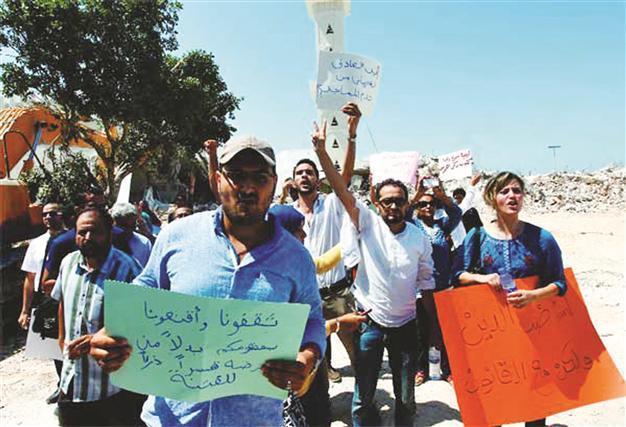Local people gather to protect holy sites
ISTANBUL

Protesters at site of the Sidi Al-Sha’ab shrine in Tripoli, which was damaged.
A wave of attacks on Muslim shrines in Libya has led to violent clashes between ultra-conservative Islamists and locals trying to protect the holy sites, according to the Art Newspaper.Three people were killed and several others were wounded in the town of Rajma, 50 kilometers from Benghazi, when extremists attempted to destroy the mausoleum of Sidi al-Lafi, the arts paper reported. This is the fourth such attack in the country in recent weeks.
Before the latest incident, people took to the streets in Tripoli, demanding that the newly elected Parliament intervene to protect the country’s vulnerable cultural heritage. The new attacks represent attempts by hard-line Islamists to dictate religious policy in the “new Libya” as the government works toward democratization.
In August, extremists destroyed three historic Sufi shrines in northern Libya: the Islamic center of Sheikh Abdel Salam al-Asmar in Zlitan, the shrine of Sidi Ahmed Zaroug in Misrata and the Sidi al-Sha’ab shrine in Tripoli. Bulldozers were brought in to destroy the Tripoli shrine.
Libya’s congress had held an emergency meeting on the matter on Aug. 26. “These kinds of actions are unacceptable and condemned by our religion,” Mohamed al-Magariaf, the president of the congress, told a televised press conference, adding that some of those who participated in the destruction were believed to be members of the security forces.
The interior minister, Fawzi Abdel A’al, promptly announced his resignation, only to withdraw it two days later, fearing that it would “further complicate security.”
According to the Art Newspaper, the attacks were carried out by Salafis, a group of extremist Sunni Muslims who see the veneration of shrines – a common practice for Sufis who follow a mystical dimension of Islam – as an act of heresy. Salafism is related to Wahhabism, which is popular in Saudi Arabia.
The majority of Libyans are Sunni who follow a more liberal school of thought.
Umar Mawloud AbduI Hamid, a member of the League of Libyan Ulema, a religious scholars’ group, condemned the attacks in August, accusing the extremists of “repeatedly attempting to undermine the stability of our country to achieve their fiendish goals” and being inspired by a “school of thought foreign to our venerable and indigenous traditions.”
Umayyad Mosque
According to Agence France Presse, in Aleppo itself, fierce clashes raged in and around the Umayyad mosque.
Rebels entered into the complex by planting an explosive device at the southern entrance, a military source said. Rebels say the army used the massive mosque complex as a base of operations because of its strategic location.
The Britain-based monitoring group said at least 101 people were killed yesterday — 36 civilians, 33 soldiers and 32 rebels.
















